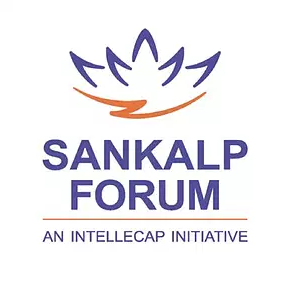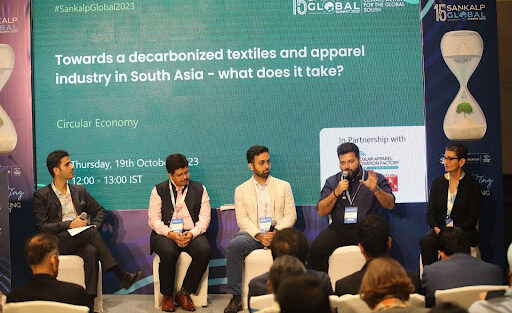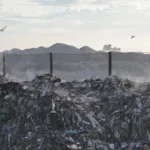Within the framework of UN COP26 Fashion industry charter of climate action, over a 100 brands and retailers have committed to achieving Net Zero emissions by 2050, with an interim target of reducing emissions by 45% by 2030. As the 2030 deadline draws near, multiple efforts have been undertaken to decarbonize the sector supply chain, however, critical gaps continue to exist between the decarbonization potential and the existing footprint of the sector.


Left to Right: Mr. Siddharth Lulla (Principal, Intellecap), Mr. Amit Kumar Singh Parihar (Director, Clean Power Program, Shakti Sustainable Energy Foundation), Mr. Akash Singh (Senior Investment Director, Sagana Capital), Mr. Nikesh Raj (Environment Program Manager, Climate & Circularity, H&M), Ms. Annie George (Sustainability Leader, Decathlon India)
In response to this challenge, Intellecap organized a panel discussion at Sankalp Global Summit 2023, that brought together leaders from the industry with the objective to develop an understanding of the broad contours of their decarbonisation strategy as well as delve into the type of innovative circular solutions required to support the industry in this transition.
The panel featured distinguished speakers including Ms. Annie George (Sustainability Leader, Decathlon India), Mr. Nikesh Raj (Environment Program Manager, Climate & Circularity, H&M), Mr. Akash Singh (Senior Investment Director, Sagana Capital), Mr. Amit Kumar Singh Parihar (Director, Clean Power Program, Shakti Sustainable Energy Foundation) and was moderated by Mr. Siddharth Lulla (Principal, Intellecap). The session also featured presentations from two promising enterprises, PRESPL & JSP Enviro, showcasing their innovations in the field.
Key highlights from the discussion are captured below:
A systemic approach to decarbonization
The majority of a brand’s carbon emissions, more than 80%, are in the form of Scope-3 emissions. In response, brands are adopting a comprehensive, supply chain-wide approach to decarbonization.
For instance, under the Science-Based Targets initiative (SBTi), Decathlon has made a commitment to reduce its carbon intensity across Scope 1, 2, and 3 emissions by a significant 53% by 2026. Annie George (Decathlon) emphasized on “taking a systemic approach to working on products including manufacturing, supply chain, packaging and transportation”. H&M has also set an ambitious target to reduce its absolute greenhouse gas emissions by 56% across the entire value chain by 2030. Nikesh Raj mentioned that “H&M is working to ensure that all suppliers, including tier 2 and tier 3, have the knowledge for this transition.”
One of the key areas of focus in this transformative journey is the efficient use of energy. Amit Parihar, from Shakti Sustainable Energy Foundation, put forth a pragmatic 3-step approach to address this challenge- “First, closely monitor performance, followed by minimizing or optimizing energy consumption, and finally, switch over to clean energy.”
Akash Singh, from Sagana Capital, also mentioned that “as investors, we seek innovative solutions for niche problems and have invested in companies addressing issues like the intermittency of renewable energy.”
Innovations and Areas of Intervention
Sustainable and circular business practices are becoming the new norm for both brands and manufacturers. Annie George stressed on eco-design saying that “design for the environment is the ultimate goal for Decathlon”. This approach emphasizes sustainable components, product longevity, repairability, and responsible end-of-life treatment, all geared towards minimizing the consumption of natural resources. H&M, on the other hand, is deeply committed to fostering a circular ecosystem. Their initiatives span product-level innovations, like incorporating recycled materials and extending product life cycles. Nikesh Raj (H&M) highlighted that “challenges arise at the manufacturing level where the brand does not have direct leverage. Incentivizing manufacturers who seek to transition, for example, through procurement guarantees, has been found to be an effective strategy.”
Challenges at ecosystem level
Creating a comprehensive program involving all ecosystem players is challenging given the complexity of the issue. As highlighted by Amit Parihar, MSMEs, the backbone of the industry, play a pivotal role in decarbonization and require robust support. This support includes the establishment of credit mechanisms to address associated credit risks. Additionally, industries are more willing to participate when large-scale public apparatus, such as distribution companies in the context of renewable energy, are actively involved. Furthermore, cost constraints voiced by brands and manufacturers necessitate the demonstration of technology or a proof of concept to secure their commitment.
Akash Singh (Sagana Capital) also spoke about some of the challenges faced by innovators such as readiness for commercial adoption; capital and support for R&D efforts from established brands; price parity given there is no long-term premium pricing available for sustainability; and support from brands in testing the solutions which can help innovators raise capital for scaling.
The session concluded with innovator showcases from PRESPL and JSP Enviro. A brief profile of these enterprises is mentioned below:
PRESPL (Col. Monish Ahuja, Managing Director)
Punjab Renewable Energy Systems Private Limited (PRESPL), is the ‘Leading Indigenous’ Indian entrepreneur in Biomass Supply Chain Management. It specializes in producing and selling steam from biomass and has served various industry segments, including textiles. Around 200,000 tonnes of biomass is utilized by the company each year, which has resulted in savings of 150,000 tonnes of CO2e.
JSP Enviro (Priyadharshini Mani, CEO)
JSP Enviro is an enterprise with revolutionary process based innovation focused on water conservation/treatment and energy efficiency. Its innovation is a water effluent treatment technology that can generate electricity from textile effluents and treat the water for reuse. The company is targeting small dyeing units in India which cannot afford large common effluent treatment plants.
The common theme throughout the session was the need to actively engage the entire ecosystem to move towards a decarbonized industry. This needs solutions across all stages of the supply chain. Intellecap, through its initiative Circular Apparel Innovation Factory (CAIF), has successfully established evidence of economic value creation and environmental footprint reduction of low carbon / circular solutions through customized pilots in its project “Accelerating Circular Economy (ACE)”. To know more, please write to them at connect@circularapparel.co




